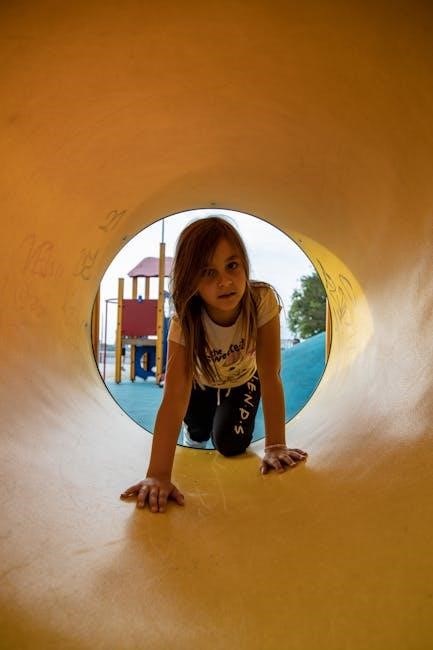Appropriate play is a dynamic concept that evolves with societal changes, cultural norms, and technological advancements, shaping how children engage, learn, and develop emotionally and cognitively.

1.1 Definition and Evolution of Appropriate Play
Appropriate play refers to age-specific, culturally sensitive activities that align with a child’s developmental stage, fostering cognitive, social, and emotional growth. Historically, its definition has evolved, influenced by societal norms, technological advancements, and educational research. Once viewed as unstructured and spontaneous, modern interpretations emphasize its role in learning, incorporating elements like digital engagement and structured creativity. Cultural variations further shape what is deemed appropriate, reflecting diverse values and practices. This dynamic concept continues to adapt, ensuring play remains a vital tool for holistic development.
1.2 Historical Context and Cultural Variations
Appropriate play has historically been shaped by cultural norms, societal values, and generational beliefs. Across time, play evolved from unstructured, spontaneous activities to more structured, purposeful engagements. Culturally, some societies emphasize group play to foster community ties, while others prioritize individual creativity. Variations in acceptable play reflect diverse values, such as differences in toy preferences or outdoor versus indoor activities. Understanding these cultural and historical contexts is crucial for defining and promoting play that aligns with specific societal and developmental goals.
1.3 The Importance of Play in Development
Play is a cornerstone of child development, fostering cognitive, emotional, and social growth. It enhances problem-solving skills, creativity, and self-regulation, while promoting language development and social interactions. Through play, children explore their surroundings, develop motor skills, and build resilience. It also provides a platform for emotional expression and empathy, crucial for healthy psychological development. Recognizing play’s role in nurturing a child’s potential highlights its significance in early childhood education and therapeutic settings, making it an essential tool for holistic development.

Types of Play
Play is categorized into exploratory, functional, symbolic, and sociodramatic types, each serving unique roles in cognitive, social, and emotional development, fostering creativity and problem-solving abilities in children.
2.1 Exploratory Play
Exploratory play involves children engaging with objects and environments to understand their properties and functions. It fosters curiosity, creativity, and problem-solving skills as children manipulate, observe, and experiment. This type of play is crucial in early development, allowing children to discover cause-and-effect relationships, develop motor skills, and build foundational knowledge about the world. Through sensory experiences and hands-on interaction, exploratory play lays the groundwork for more complex forms of play, encouraging independent learning and adaptability in various situations.
2.2 Functional Play
Functional play involves using objects or materials in ways that reflect their intended purpose, such as pretend cooking or feeding a doll. This type of play helps children learn about the world by mimicking real-life activities, promoting repetition and mastery of skills. It is often repetitive, allowing children to practice and refine their actions, which enhances cognitive and motor development. Functional play also serves as a precursor to more complex forms of play, such as symbolic play, by teaching children how objects are used in meaningful contexts.
2.3 Symbolic Play

Symbolic play involves using objects or actions to represent other things, fostering creativity and abstract thinking. It includes pretend scenarios, role-playing, and imaginative storytelling, allowing children to explore ideas and emotions. This type of play enhances problem-solving skills, language development, and social understanding. By engaging in symbolic play, children learn to assign meanings to objects and situations, laying the groundwork for advanced cognitive and communication abilities. It also encourages emotional expression and cooperation, making it a cornerstone of healthy development.
2.4 Sociodramatic Play
Sociodramatic play involves collaborative, imaginative scenarios where children assign roles and act out social situations. It fosters cooperation, communication, and emotional regulation. This advanced form of symbolic play enhances socioemotional skills, encouraging empathy and understanding of societal roles. By engaging in shared narratives, children develop language abilities and problem-solving strategies. Sociodramatic play also supports the exploration of complex emotions, helping children navigate interpersonal dynamics and build stronger social connections. It is a vital component of healthy development, promoting both individual growth and community interaction.

The Role of Play in Learning and Development
Play is essential for learning and development, fostering creativity, problem-solving, and emotional intelligence. It helps children explore their world, develop social skills, and build a foundation for future success.
3.1 Cognitive Benefits of Play
Play significantly enhances cognitive development by fostering problem-solving, creativity, and critical thinking. It helps children develop memory, concentration, and spatial awareness while encouraging exploration and experimentation. Through play, children learn to process information, understand cause-and-effect relationships, and develop language skills. Engaging in imaginative and constructive play stimulates innovation and adaptability, preparing them for future challenges. These cognitive benefits lay a strong foundation for lifelong learning and intellectual growth, making play an indispensable part of a child’s developmental journey.
3.2 Social and Emotional Growth Through Play
Play fosters social and emotional growth by encouraging collaboration, empathy, and self-awareness. Children develop essential skills like cooperation, conflict resolution, and understanding others’ perspectives. Through imaginative and role-playing activities, they explore emotions and relationships, enhancing emotional intelligence. Play also promotes self-regulation, resilience, and confidence, helping children navigate social challenges and build meaningful connections. These experiences are crucial for forming healthy relationships and achieving emotional well-being throughout their lives.
3.3 Play as a Tool for Problem-Solving
Play serves as a powerful medium for developing problem-solving skills in children. Through exploration and experimentation, children learn cause-and-effect relationships, fostering critical thinking. Play encourages creativity, as kids invent solutions and adapt objects to new uses. This process of trial and error builds persistence and resilience, essential for overcoming challenges. By navigating imaginary scenarios and real-world obstacles, children refine their ability to approach problems methodically and innovatively, preparing them for lifelong learning and adaptability.

Appropriate Play in Therapy and Education
Appropriate play in therapy and education is a tool for addressing developmental needs, fostering creativity, and promoting inclusive learning environments, tailored to individual and cultural contexts.
4.1 Play Therapy for Children
Play therapy is a powerful tool for children to express emotions and address psychological challenges. It creates a safe, non-verbal environment where children communicate through play, exploring feelings and developing problem-solving skills. Trained therapists guide the process, using toys and activities to foster emotional growth and social interactions. This approach is tailored to the child’s developmental level, making it effective for various emotional and behavioral difficulties. Play therapy isn’t just playful—it’s a structured method to help children navigate challenges and thrive.
4.2 Play-Based Learning in Classrooms
Play-based learning integrates play into the curriculum, allowing children to explore concepts through hands-on experiences. It fosters creativity, problem-solving, and social skills, while encouraging intrinsic motivation. Teachers act as facilitators, providing resources and guiding children as they engage in self-directed learning. This approach supports language development, emotional regulation, and collaboration, making it a valuable tool for holistic education. Play-based learning is particularly effective in early childhood education, where it aligns with children’s natural ways of understanding the world.
4.3 Supporting Play in Autistic Children
Supporting play in autistic children requires tailored approaches that respect their unique needs and interests. Strategies include creating sensory-friendly environments, using visual supports like PECS, and incorporating repetitive or focused interests into play. Adults should facilitate rather than direct, allowing children to lead while providing gentle guidance. Play-based interventions can enhance social, communication, and imaginative skills, fostering a sense of joy and mastery. Individualized support ensures play is meaningful and developmentally appropriate for each child.

Challenges and Misconceptions About Appropriate Play
Challenges include misconceptions that play is unimportant or merely entertainment, while cultural and generational differences often shape conflicting views on what constitutes appropriate play.
5.1 Common Misconceptions About Play
A prevalent misconception is that play is merely a form of entertainment rather than a crucial developmental tool. Many view unstructured play as a waste of time, undermining its role in fostering creativity, problem-solving, and social skills. Additionally, some believe that play should always be adult-directed, neglecting the value of child-led exploration. These misconceptions often stem from cultural or generational influences, highlighting the need for education on play’s significance in holistic development.
5.2 Balancing Structured and Unstructured Play
Balancing structured and unstructured play is essential for holistic development. Structured play, guided by adults, fosters specific skills like problem-solving and teamwork, while unstructured play allows children to explore freely, promoting creativity and self-directed learning. Overemphasizing structure can stifle creativity, whereas excessive unstructured play may lack focus. Finding this balance ensures children benefit from both guided activities and open-ended exploration, supporting their cognitive, social, and emotional growth effectively.
5.3 Addressing Cultural and Generational Differences
Cultural and generational differences significantly influence perceptions of appropriate play. What is deemed suitable in one culture or generation may vary elsewhere, reflecting unique values, traditions, and societal norms. Recognizing these differences is crucial for fostering inclusive environments where diverse play practices are respected. Adults must be aware of these nuances to support children effectively, ensuring play remains a universal language that bridges cultural gaps and promotes understanding across generations. This awareness enhances the ability to adapt play strategies to meet varied needs.
Best Practices for Promoting Appropriate Play
Creating play-friendly environments, encouraging child-led play, and supporting children with minimal adult intervention are key practices that foster creativity and skill development in children effectively.
6.1 Creating Play-Friendly Environments
Play-friendly environments are essential for fostering creativity and exploration. These spaces should be safe, accessible, and equipped with diverse materials to cater to various interests and developmental levels. Open areas for movement, imaginative play tools, and interactive elements encourage children to engage freely. Incorporating natural elements, such as green spaces, further enhances play experiences. Teachers and caregivers must ensure these environments are adaptable, allowing children to explore and learn at their own pace without overly structured constraints. Such settings promote skill development and self-directed learning effectively.
6.2 Encouraging Child-Led Play
Encouraging child-led play involves allowing children to take ownership of their experiences, making choices, and exploring freely. This approach fosters creativity, problem-solving, and self-confidence. Adults should act as facilitators, providing resources and guidance while refraining from direct interference. Child-led play promotes intrinsic motivation and immersion, enabling children to learn at their own pace. By trusting children to direct their play, adults support their natural curiosity and encourage independent learning. This method is vital for developing critical thinking and emotional resilience in a nurturing environment.
6.3 The Role of Adults in Supporting Play
Adults play a crucial role in fostering appropriate play by creating safe, engaging environments and offering guidance without imposing control. They should observe, listen, and provide resources to enhance play experiences. Encouraging imaginative and exploratory activities helps children develop social, emotional, and cognitive skills. Adults should act as facilitators, supporting children’s natural curiosity and creativity while allowing them the freedom to learn and grow through play. This balanced approach ensures children benefit fully from their play experiences, both independently and collaboratively.
Appropriate play is essential for childhood development, fostering cognitive, social, and emotional growth. It adapts to cultural and societal changes, remaining a cornerstone of learning and creativity. By understanding its evolution and benefits, adults can better support children’s play experiences, creating balanced environments that encourage exploration and imagination. As research evolves, the importance of play in development will continue to be refined, ensuring future generations benefit from its enduring value in shaping well-rounded individuals.
